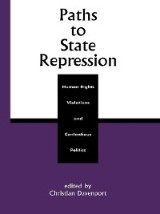Details

Paths to State Repression
Human Rights Violations and Contentious Politics|
29,99 € |
|
| Verlag: | Rowman & Littlefield Publishers |
| Format: | EPUB |
| Veröffentl.: | 15.03.2000 |
| ISBN/EAN: | 9781461640592 |
| Sprache: | englisch |
| Anzahl Seiten: | 264 |
DRM-geschütztes eBook, Sie benötigen z.B. Adobe Digital Editions und eine Adobe ID zum Lesen.
Beschreibungen
In the last ten years, there has been a resurgence of interest in repression and violence within states. Paths to State Repression improves our understanding of why states use political repression, highlighting its relationship to dissent and mass protest. The authors draw upon a wide variety of political-economic contexts, methodological approaches, and geographic locales, including Cuba, Nicaragua, Peru, Sri Lanka, Indonesia, Israel, Eastern Europe, and Africa. This book is invaluable to all who wish to better understand why central authorities violate and restrict human rights and how states can break their cycles of conflict.
In the last ten years, there has been a resurgence of interest in repression and violence within states. Paths to State Repression improves our understanding of why states use political repression, highlighting its relationship to dissent and mass protest. The authors draw upon a wide variety of political-economic contexts, methodological approaches, and geographic locales, including Cuba, Nicaragua, Peru, Sri Lanka, Indonesia, Israel, Eastern Europe, and Africa.
Chapter 1 Introduction
<br>Part 2 Part I: Domestic Threats, Dissent, and State Repression
<br>Chapter 3 Domestic Threats: The Abuse of Personal Integrity
<br>Chapter 4 Political Repression: Threat Perception and Transnational Solidarity Groups
<br>Chapter 5 Protest Targeting and Repression: Campaigns against Water Projects in Indonesia
<br>Part 6 Part II: Exploring Dynamic Interactions
<br>Chapter 7 Coercion and Protest: An Empirical Test Revisited
<br>Chapter 8 Why Are Collective Conflicts Stable?
<br>Chapter 9 Mobilization, Opportunity Structure, and Polity Responsiveness: The Role of Repression in the Intifada
<br>Part 10 Part III: Bringing the State Back In (Again)
<br>Chapter 11 Protest, Democratization, and Human Rights in Africa
<br>Chapter 12 8 Exploring the Ameliorating Effects of Democracy on Political Repression: Cross-National Evidence
<br>Part 2 Part I: Domestic Threats, Dissent, and State Repression
<br>Chapter 3 Domestic Threats: The Abuse of Personal Integrity
<br>Chapter 4 Political Repression: Threat Perception and Transnational Solidarity Groups
<br>Chapter 5 Protest Targeting and Repression: Campaigns against Water Projects in Indonesia
<br>Part 6 Part II: Exploring Dynamic Interactions
<br>Chapter 7 Coercion and Protest: An Empirical Test Revisited
<br>Chapter 8 Why Are Collective Conflicts Stable?
<br>Chapter 9 Mobilization, Opportunity Structure, and Polity Responsiveness: The Role of Repression in the Intifada
<br>Part 10 Part III: Bringing the State Back In (Again)
<br>Chapter 11 Protest, Democratization, and Human Rights in Africa
<br>Chapter 12 8 Exploring the Ameliorating Effects of Democracy on Political Repression: Cross-National Evidence
Christian Davenport is associate professor of government and politics and senior fellow and director of research for the Center for International Development and Conflict Management at the University of Maryland, College Park.

















